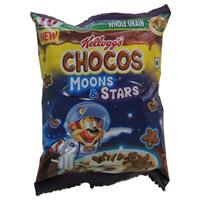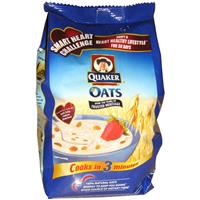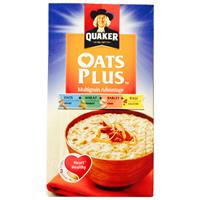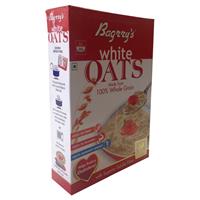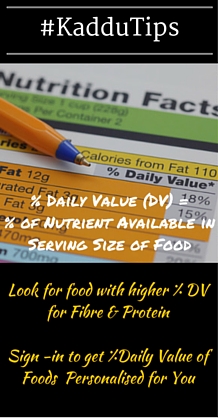
Kellogg's Chocos Moons & Stars
Products in ‘Cereals & Muesli’ category range from 2.5 - 5


- Compliments of Vitamins & MineralsThe micronutrients (Vitamins/Minerals) play an important role by ensuring proper functioning of cells and tissues.Each vitamin and trace mineral play a specific role in the body. For example, Vitamin C acts as antioxidant protecting cells from environmental damage, healing wounds and maintaining connective tissue whereas minerals like sodium, potassium and chloride function as electrolytes that assist in communication between cells necessary for nerve impulses and muscle contraction.Some products mimic the nature by adding artificial vitamins or minerals which have an identical form and function to those found in nature, but they are manufactured synthetically to meet extremely high standards of processed products.
- FAT - Get more of the Good than Bad !!While reading about FAT in food, you will come across terms : Saturated Fat, Unsaturated Fat (MUFA / PUFA), Trans Fat and Cholesterol.Saturated Fats (SFA) can increase the Cholesterol in the blood and thereby increase the risk of Heart Disease. Read the Nutrition Label and choose the product with less SFA.Monounsaturated Fat (MUFA) and Polyunsaturated Fats (PUFA) are the two types of unsaturated fats you will find on food package label. Monounsaturated Fat have a blood cholesterol lowering effect and can lower the risk of heart disease. It is recommended to include food with more MUFA and PUFA as compared to SFA in the diet to help reduce heart disease risks.Trans Fat not only increases the bad LDL cholesterol, but also reduces the good HDL cholesterol and hence should be avoided. Trans Fat are formed during the hydrogenation process where in the unsaturated fat is converted to hydrogenated fat / oil to increase shelf life. Look out for Hydrogenated or Partially Hydrogenated Fat / Oil in the ingredients in the label as these products would have Trans Fat.Cholesterol is only found in food from animal source such as milk. Our bodies create most of required cholesterol and hence consumption of food with cholesterol should be limited.All Fat is not bad ! Look for the products which have more MUFA, PUFA and avoid those with more SFA, Trans Fat and Cholesterol.
- Know Your Food - CocoaCocoa is the main ingredient in all chocolates. You will find it as one of the following names: Cocoa Solids, Cocoa Powder, Cocoa Mass or Liquor, Cocoa Butter. Except for Cocoa Butter which makes up for all the fat in the cocoa, all other forms have a small quantity of caffeine.
That's right! Its not only Coffee that gives you the caffeine but your favourite bar of chocolate may also have small quantity of Caffeine.
The darker the chocolate, the higher would be amount of Caffeine. But there's another side of the coin, The higher percentage of cocoa equals a higher amount of flavonoids.
Flavonoids are powerful antioxidants founds in fruits, veges, herbs, and other plant-based foods. Antioxidants help protect us against damage caused. by free radicals.
Read through our blog 'The sweet kick of Chocolate' to learn more about the dark secrets of your favorite bar. - Loaded with Sugar
Each serving of the product has at least 1 teaspoon (5g) of sugar in it which makes it a sugar rich product.
One of the immediate side effects of high sugar intake is increase in fat deposits in the body which may increase your risk for obesity,diabetes and a host of other conditions.
Also, some studies suggest that its not FAT but sugar that is the cause for excess weight gain. Hence, best to avoid.
Disclaimer:Product Analysis is based on general practices in the field of Nutrition. Please check with or consult a qualified and licensed medical professional for its suitability to you.

